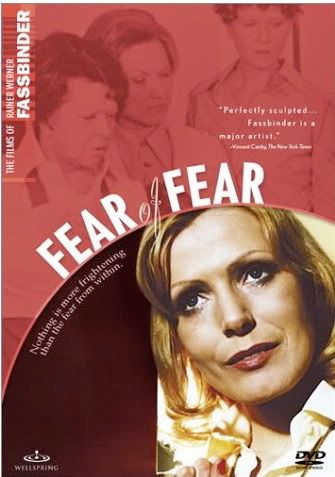Fear of Fear (RW Fassbinder, 1975)
 Fear of Fear is a TV movie made by Fassbinder in 1975, at the beginning of the height of his German popularity. The plot does indeed sound like the modern, American version of TV movies: Margot (Margit Carstensen), housewife and mother of two children, becomes increasingly bored and anxious with everyday life. She becomes convinced that she is going insane, and even submits to a quasi-affair with the doctor across the street. The whole time, no one listens to her, and everyone simply provides her with valium to relieve her anxiety. They are not uncaring (well, at least her husband isn't), it's just that this everyday world makes it nearly impossible to care deeply about someone other than oneself. It sounds like total Lifetime Channel material, but Fassbinder has this way of taking everyday melodrama and turning it into something extremely meaningful and almost universal. Nowhere is this more apparent than in Fear of Fear, one of his lesser works, but one of my favorites. I have relatively little to say about the acting and writing, other than the fact that both are tremendously effective and moving. This film is so amazingly directed that I actually took some notes on it while watching! There are countless perfectly choreographed scenes, especially the ones where Margot bumps into the mysterious Mr. Bauer on the street. Seen from up above, the characters pass one another, and then, at the same time, turn around to look at one another. It's marvelous to see. Another pristine directing tool Fassbinder uses is the close-up shot; it is at once a glimpse into Margot's inner self, and only a longer look at the mask she wears to the world. Many of these shots show Margot's face from behind the person talking to her, so that only half of her face is visible. This ever so subtly presents Margot as only half a real person, what she is inside herself. Fassbinder was critiqued in his lifetime by everyone: the left, the right, and especially some feminist critics. It's surprising, then, that Fear of Fear is on feminism's side! Fassbinder gives us a personal, intimate portrait of the problem without a name, the feminists' issue of the housewife with nothing to do who medicates to get rid of her problems, when all she needs is a life of her own. Fassbinder pretty strongly suggests that if Margot was able to get outside of herself, of the life that has been forced upon her, she would be happier; we see this as Margot is happiest when shopping (before she remembers herself), or drinking and listening to a record on headphones. In other words, Margot is happiest when she's not a mother or wife. She clings desperately to her daughter, but once her second child is born, she seems to drift away from them. She is constantly under surveillance from her mother- and sister-in-law, and is watched through the window whenever she leaves the house. Fassbinder, strangely enough, enumerates this feminist problem in one of the most effective, empathetic films I've ever seen. Can you tell I miss writing papers? This movie, though, deserves this kind of verbosity; it is the stuff that essays and intellectual thought on movies are made of. Sure, there are some flaws, but none that take away from the near-perfect execution. This movie is Fassbinder, pure and simple. I don't really believe that you can love Fassbinder without loving this movie. Essential viewing. 9.5/10 RIYL: Fassbinder, Volker Schlondorff Labels: 1975, rainer werner fassbinder |

Comments on "Fear of Fear (RW Fassbinder, 1975)"
post a comment